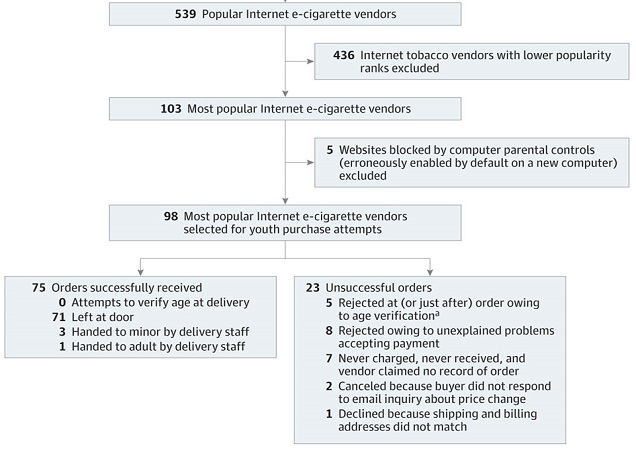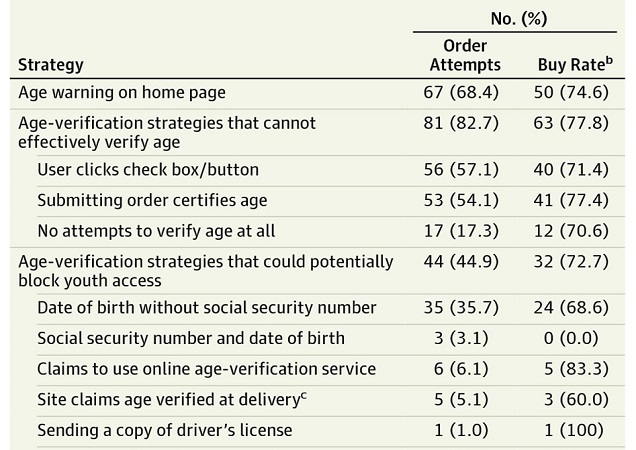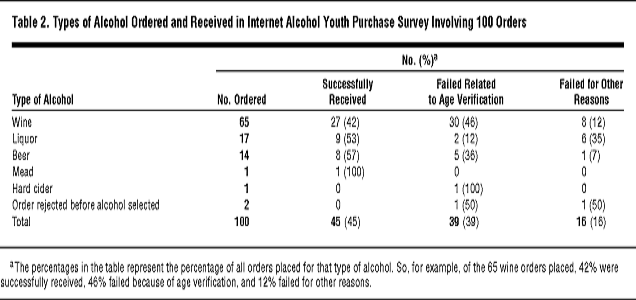
According to a new study, minors can “easily” buy e-cigarettes online – provided they’re happy to lie about their age and are in possession of a credit card – so the authors argue that adult vapers shouldn’t be able to receive deliveries. The finding is destined to reignite the continuing furor about youth vaping, sparking the concerns that e-cigarette companies are on some sort of devious mission to lure non-smoking youth into nicotine addiction. The study proudly proclaims that youths can buy e-cigarettes in almost 94 percent of cases, and suggests that delivery companies should institute a ban on shipping e-cigarettes, effectively proposing crippling the industry for what must be the most ridiculous reason yet. The message is: some teenagers could lie about their age and have access to a suitable bank card, so adult vapers shouldn’t be able to receive devices and e-liquids in the mail.
Summary
- 11 teens – aged 14 to 17 – visited 98 e-cigarette websites, aiming to purchase the cheapest disposable or starter kit they could.
- They lied about their age, used their parents identity and credit card where needed, and shipping was requested by USPS wherever possible, who don’t perform age verification at delivery.
- 76.5 percent of orders were delivered, but only 5 were rejected explicitly due to age verification issues. Discounting the miscellaneous website errors (including 8 which may have been related to age) 93.7 percent of orders were successful.
- Most vendors only used verification requiring clicking a button, checking a box or entering date of birth, which are easily overcome. The most successful approach was date of birth in conjunction with social security number.
- 88 percent of deliveries used USPS, and 95 percent were simply left at the door, so no age verification was performed. The authors advocate extending the cigarette shipping ban to include e-cigs.
- E-cigarette sellers clearly need to improve their age verification process, but if teens – as in this study – were ready to assume a parent’s identity and use his or her credit card, it seems little could be done to prevent it.
What They Did – Lying to Companies to Receive E-Cigarettes
The study (full text paywalled) was fairly straightforward: 11 non-smoking youths (the “non-smoking” part is entirely irrelevant, but makes it sound worse) aged 14 to 17 visited websites of e-cigarette vendors under supervision of a researcher, attempting to buy the cheapest disposable e-cig or the cheapest starter kit. They ended up visiting 98 websites in total, which sadly weren’t named, so we can’t check any out for ourselves.
If the participants encountered any requests for age verification, they were instructed to type in fake birthdates, lie and otherwise confirm that they were over 18 in any way possible. They also were allowed to use their parents’ driving licenses where necessary to help the process along. The teens tried to make purchases their own identities first, and if that wasn’t possible, they used a parent’s name. The authors helpfully point out “The legal definition of identity theft is using someone’s identity without their permission, so no laws were broken.” Apparently, the fact that using a parents’ identity would be breaking the law in a realistic situation wasn’t a concern.
Finally, they wanted to see if the people who delivered the packages performed age verification checks, and asked the youths to answer the door themselves if they were home. Additionally, they looked to see if the e-cigarette vendors used age verification at delivery, which is provided by UPS, DHL and FedEx. However, if the option was available they instead chose to use the USPS, which doesn’t perform such checks.
What They Found – Most E-Cig Sellers Have Poor Age Verification

They made 98 attempts to buy e-cigs, with 75 of them (76.5 percent) being successfully delivered. The majority of those not delivered weren’t explicitly due to issues relating to the customer’s age, and discounting these, just 5 out of 80 were rejected due to age verification issues – in other words, 93.7 percent of these orders were successful. However, an additional 8 orders were rejected “due to unexplained problems” accepting payment – the authors don’t speculate about these orders, but it seems possible that the age of the purchaser could have had a role to play. If it did, then the number of successful orders (discounting those clearly unrelated to age) drops to 85.2 percent.

It’s clear, though, that the age verification process on many websites is pretty useless. Age warnings were the most commonly used, by around 68 percent of vendors, followed by requesting users click a button or check a box to verify age (57 percent), a statement that submitting an order also verifies your age (54 percent) and requesting a date of birth (around 36 percent). In just over 17 percent of cases, there was no attempt to verify age. Some strategies would obviously be more effective, such as combining social security number and date of birth (3 vendors did this, and none let the minor make the purchase) or verifying age at delivery.
You might have wondered why they decided that a driver’s license would be useful in this process, and indeed, it rarely ever came up. One that used online age verification and actually failed the individual (the other five using approach this didn’t) requested a driver’s license, but it was never sent (the researchers didn’t get around to it, apparently). Another would have requested a driver’s license had third-party verification failed, but since fake details were used, the need to send a driving license was bypassed altogether. They would have just sent the parent’s license anyway, so it wouldn’t have really made a difference.
The findings relating to delivery are the most misleading. They point out that none of the companies claiming to check age at delivery actually did, but they knew full well that the USPS doesn’t provide that service and specifically requested it be used wherever possible. 88 percent of orders went through USPS, and three of those claiming age verification at the door ended up making the delivery.
However, the image this forms of a delivery-person looking an obviously under-age kid in the face and handing over an addictive substance is wholly misleading: 95 percent of deliveries were simply left at the door, so there was literally no opportunity to verify age and likely no indication that it was needed (in the absence of clear markings on the package), even if the company actually offered the service. The e-cig vendors should have refused to use USPS, indeed, but it’s understandable to give customers shipping options.
They also make a big deal out of the fact that major delivery companies refuse to ship cigarettes, and suggest that those bans should be extended to include e-cigarettes. This is a fascinatingly idiotic idea, which, if implemented, would primarily serve to prevent adult consumers from being able to access high-quality devices without heading to a local B&M. Let’s not forget that this study only shows that teens could buy an e-cigarette online (if they have a credit or pre-paid debit card and can hide the whole process from their parents), not that they are. In fact, all studies addressing youth vaping have found very low rates of use, except among smoking teens, so there’s no reason to even think this is a significant issue.
Buying Alcohol and Cigarettes Online

Lead author Rebecca Williams has done very similar research in the past. The study looking at online alcohol purchases is quite interesting: in this, kids couldn’t lie about their age when asked to verify – unlike in this study – and used pre-paid Visa cards – unlike in this study, where credit cards were explicitly stated to have been used. Moreover, shipping companies clearly label alcohol to ensure drivers check the customer’s age at the door. Even with all of these factors, 45 percent of orders were still received. In a similar piece of cigarette-related research (from 2003 – laws have been passed since then), 91.6 percent of attempted purchases resulted in successful delivery.
So it’s not an issue limited to e-cigarettes, and a couple of problems are immediately obvious. Firstly, outside of teens with enough money to meet the payments or ones with parents willing to cosign for it, under 21s cannot get a credit card. Sadly, the methods section of this study merely said that either the teen or parent’s credit card was used, but with these limitations in mind, in most cases it’s likely to have been the parent’s. More precision in their description of both the methods and the results would have been ideal, because many things aren’t clear from reading the study.
Secondly, as Williams herself points out in the cigarette study (but not this one, strangely), there are many other issues with getting a package you’re not supposed to when living with your parents. As in, you have to completely hide the delivery and the fact it’s been purchased.
Improving Age Verification is Important; Banning E-Cigarette Deliveries is Stupid
So the study isn’t realistic for most – unless you’re a teen with a usable card and plenty of money – and in many ways seems designed to stir up controversy, but it obviously does have a core point most of us will agree with. Age verification processes should be improved, and all vendors should do everything they can to prevent sales to minors. However, if the minors lie about their age, have the option of using their parent’s identity and probably their credit card, as in this study, they’ll likely be successful in many cases anyway. Is this reason to ban all online sales or ban deliveries of e-cigarettes to adults, as suggested by the authors? Unless you want to restrict access to the most effective e-cigs and thereby hinder attempts to quit smoking, the answer would be a firm and resolute “no.”

